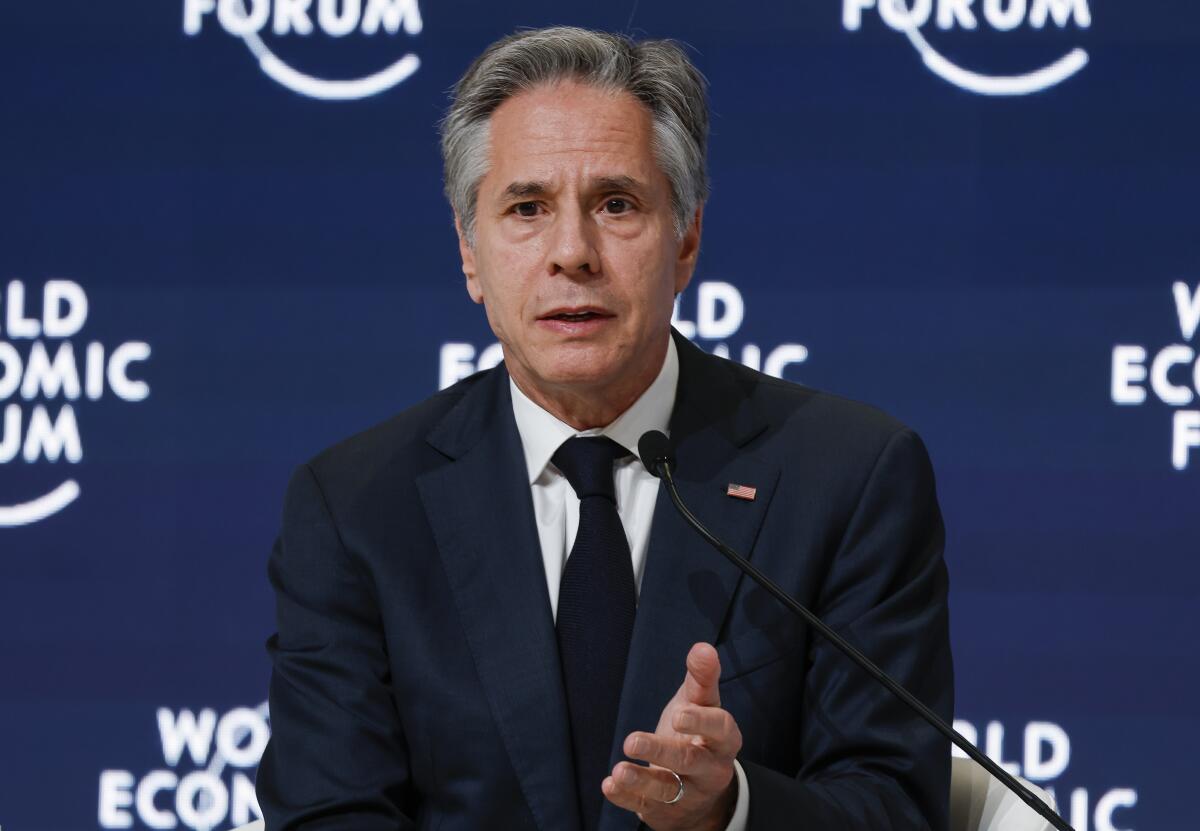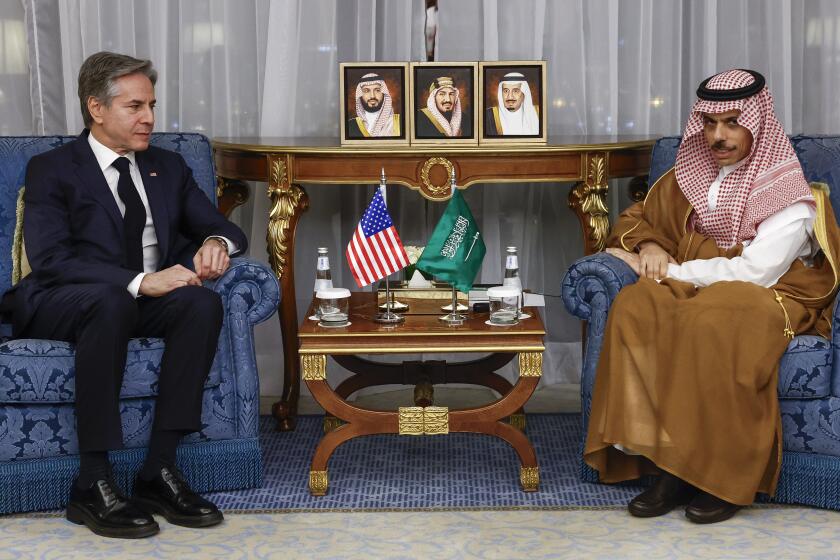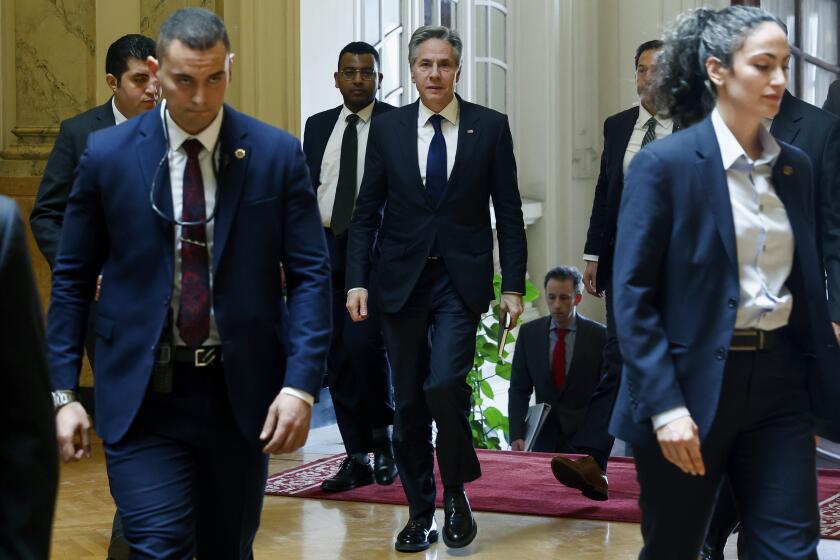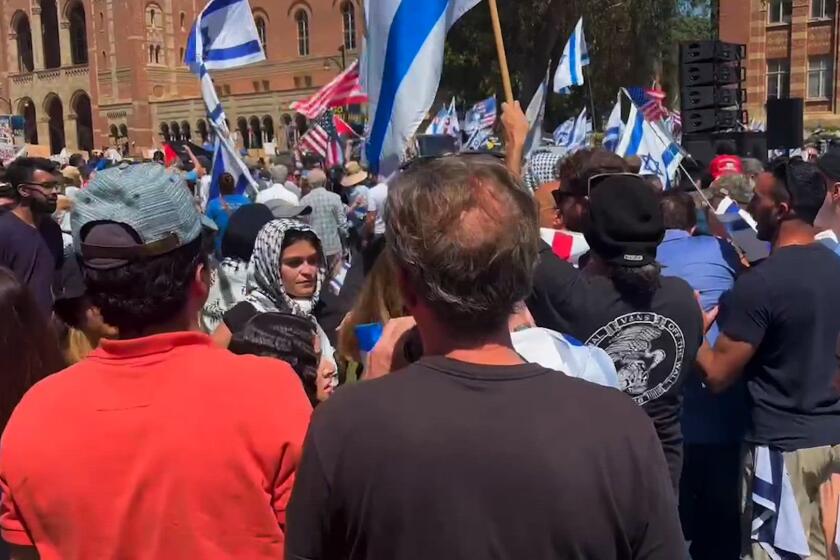Blinken says Israel must still do more to boost humanitarian aid to Gaza

- Share via
RIYADH, Saudi Arabia — U.S. Secretary of State Antony J. Blinken said Monday that Israel must still do more to increase the flow of humanitarian aid into the besieged Gaza Strip and that he would use his current Middle East trip — his seventh to the region since the Israel-Hamas war started in October — to press that case with Israeli leaders.
Speaking at events in Riyadh, Blinken said the best way to ease the humanitarian catastrophe in Gaza would be to conclude an elusive cease-fire agreement that would release hostages held by Hamas. And, he said, Hamas had been presented with an “extraordinarily generous” offer by Israel that he hoped the group would accept.
“Hamas has before it a proposal that is extraordinarily, extraordinarily generous on the part of Israel and in this moment the only thing standing between the people of Gaza and cease-fire is Hamas,” he said at a World Economic Forum gathering in the Saudi capital.
U.S. Secretary of State Antony J. Blinken will travel to Israel this week as part of his sixth urgent mission to the Middle East.
“They have to decide, and they have to decide quickly. So, we’re looking to that and I’m hopeful that they will make the right decision and we can have a fundamental change in the dynamic,” Blinken said.
Although talks continue, Hamas has thus far balked at a series of offers negotiated by Egypt, Qatar and the United States and agreed to by Israel, and even without a deal, Blinken said it was critical to improve conditions in Gaza now.
“We’re also not waiting on a cease-fire to take the necessary steps to meet the needs of civilians in Gaza,” Blinken told Gulf Cooperation Council foreign ministers earlier Monday.
“We have seen measurable progress in the last few weeks, including the opening of new crossings and increased volume of aid delivery to Gaza and within Gaza, and the building of the U.S. maritime corridor, which will open in the coming weeks. But it is not enough. We still need to get more aid in and around Gaza,” he said.
U.S. Secretary of State Antony J. Blinken huddled with top Arab diplomats in Cairo to discuss post-conflict plans for the Gaza Strip.
“We need to improve deconfliction with humanitarian assistance workers. And we have to find greater efficiency and greater safety and deconfliction is at the heart of that. And, finally we have to make sure that we’re focusing not just on inputs, but on impact.”
Scores of relief workers have been killed since the conflict began, and a deadly Israeli attack on a World Central Kitchen aid convoy in Gaza this month only highlighted the dangers and difficulties of protecting them. Israel has said the strike was a mistake and has disciplined officials involved.
World Central Kitchen says it would resume operations in Gaza on Monday after a four-week suspension.
The war has ground on since Hamas’ deadly Oct. 7 attacks on Israel with little end in sight: More than 34,000 Palestinians have been killed, hundreds of thousands more are displaced and a humanitarian crisis in Gaza is worsening.
Biden tells Israel’s Netanyahu future U.S. support for war depends on new steps to protect civilians
President Biden has told Israeli Prime Minister Benjamin Netanyahu that future U.S. support for the Gaza war depends on new steps to protect civilians and aid workers.
The conflict has fueled mass protests around the world that have spread to American college campuses. U.S. support for Israel, particularly arms transfers, has come under particular criticism, something the administration is keenly aware poses potential problems for President Biden in an election year.
Blinken’s trip comes amid renewed concerns about the conflict spreading in the Middle East and with once-promising prospects for Israeli-Saudi rapprochement effectively on hold as Israel refuses to consider one of the Saudis’ main conditions for normalized relations: the creation of a Palestinian state.
Meanwhile, the Biden administration has been warning Israel against a major military operation on the southern Gaza city of Rafah, where more than a million Palestinians have fled to escape fighting farther north. Israel has not yet launched such an offensive, but Netanyahu has repeatedly said that one will take place, asserting that it is the only way to wipe out Hamas.
Both topics were discussed during the Biden-Netanyahu phone call Sunday, according to the White House and U.S. officials.
Pro-Israel and pro-Palestinian demonstrators clash Sunday at UCLA, one day after protests erupted again at USC, where 93 people were arrested last week.
During his trip, Blinken said he would also underscore the absolute importance of not allowing the Israel-Hamas conflict to engulf the region.
The danger of conflagration was underscored this month when a suspected Israeli attack on an Iranian consular building in Syria prompted an unprecedented direct missile and drone response by Iran against Israel. An apparent retaliatory Israeli strike on Iran followed.
Although the tit-for-tat cycle appears to have ended for now, deep concerns remain that Iran or its proxies in Iraq, Lebanon, Syria or Yemen could act in such a way as to provoke a greater response from Israel or that Israel might take action that Iran feels it must retaliate for.
Lee writes for the Associated Press.
More to Read
Sign up for Essential California
The most important California stories and recommendations in your inbox every morning.
You may occasionally receive promotional content from the Los Angeles Times.














